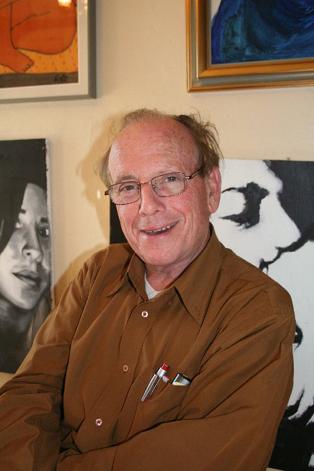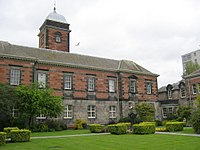Janus kinase (JAK) is a family of intracellular, non-receptor tyrosine kinases that transduce cytokine-mediated signals via the JAK-STAT pathway. They were initially named "just another kinase" 1 and 2, but were ultimately published as "Janus kinase". The name is taken from the two-faced Roman god of beginnings, endings and duality, Janus, because the JAKs possess two near-identical phosphate-transferring domains. One domain exhibits the kinase activity, while the other negatively regulates the kinase activity of the first.

The B-cell receptor (BCR) is a transmembrane protein on the surface of a B cell. A B-cell receptor is composed of a membrane-bound immunoglobulin molecule and a signal transduction moiety. The former forms a type 1 transmembrane receptor protein, and is typically located on the outer surface of these lymphocyte cells. Through biochemical signaling and by physically acquiring antigens from the immune synapses, the BCR controls the activation of the B cell. B cells are able to gather and grab antigens by engaging biochemical modules for receptor clustering, cell spreading, generation of pulling forces, and receptor transport, which eventually culminates in endocytosis and antigen presentation. B cells' mechanical activity adheres to a pattern of negative and positive feedbacks that regulate the quantity of removed antigen by manipulating the dynamic of BCR–antigen bonds directly. Particularly, grouping and spreading increase the relation of antigen with BCR, thereby proving sensitivity and amplification. On the other hand, pulling forces delinks the antigen from the BCR, thus testing the quality of antigen binding.

Regeneron Pharmaceuticals, Inc. is an American biotechnology company headquartered in Westchester County, New York. The company was founded in 1988. Originally focused on neurotrophic factors and their regenerative capabilities, giving rise to its name, the company branched out into the study of both cytokine and tyrosine kinase receptors, which gave rise to their first product, which is a VEGF-trap.
Chemical modification refers to a number of various processes involving the alteration of the chemical constitution or structure of molecules.
Sir Philip Cohen is a distinguished British biochemist known for his extensive contributions to the field of biochemistry, especially to the understanding of the role of reversible protein phosphorylation in cell regulation.
David Moore Glover is a British geneticist and Research Professor of Biology and Biological Engineering at the California Institute of Technology. He served as Balfour Professor of Genetics at the University of Cambridge, a Wellcome Trust investigator in the Department of Genetics at the University of Cambridge, and Fellow of Fitzwilliam College, Cambridge. He serves as the first editor-in-chief of the open-access journal Open Biology published by the Royal Society.

Tyrosine-protein kinase JAK3 is a tyrosine kinase enzyme that in humans is encoded by the JAK3 gene.

Alexander Levitzki is an Israeli biochemist who is a professor of biochemistry at the Alexander Silberman Institute of Life Sciences, the Hebrew University of Jerusalem.
The IκB kinase is an enzyme complex that is involved in propagating the cellular response to inflammation, specifically the regulation of lymphocytes.

Mitogen-activated protein kinase kinase kinase 7 (MAP3K7), also known as TAK1, is an enzyme that in humans is encoded by the MAP3K7 gene.

14-3-3 protein eta also referred to as 14-3-3η is a protein that in humans is encoded by the YWHAH gene.
Sir Marc Feldmann is an Australian-educated British immunologist. He is a professor at the University of Oxford and a senior research fellow at Somerville College, Oxford.

Nicholas B. Lydon FRS is a British scientist and entrepreneur. In 2009, he was awarded the Lasker Clinical Award and in 2012 the Japan Prize for the development of Gleevec, also known as Imatinib, a selective BCR-ABL inhibitor for the treatment of chronic myeloid leukaemia (CML), which converted a fatal cancer into a manageable chronic condition.

A tyrosine kinase inhibitor (TKI) is a pharmaceutical drug that inhibits tyrosine kinases. Tyrosine kinases are enzymes responsible for the activation of many proteins by signal transduction cascades. The proteins are activated by adding a phosphate group to the protein (phosphorylation), a step that TKIs inhibit. TKIs are typically used as anticancer drugs. For example, they have substantially improved outcomes in chronic myelogenous leukemia. They have also been used to treat other diseases, such as idiopathic pulmonary fibrosis.
Dario Renato Alessi is a French-born British biochemist, Director of the Medical Research Council Protein Phosphorylation and Ubiquitylation Unit and Professor of Signal Transduction, at the School of Life Sciences, University of Dundee.
Galapagos NV is a Belgian pharmaceutical research company which was founded in 1999. Its headquarters are located in Mechelen and has additional locations in Leiden, Romainville, Basel, Milan, Madrid, Boston and Zagreb.

Anthony Rex Hunter is a British-American biologist who is a professor of biology at the Salk Institute for Biological Studies and the University of California San Diego. His research publications list his name as Tony Hunter.
Sir Charles Peter Downes, known as Pete Downes, is a British biochemist and chairman of Dynamic Earth in Edinburgh. Downes served as Principal and Vice-Chancellor of the University of Dundee from 2009 until 2018. He is the former Head of the College of Life Sciences and co-founder of the Division of Signal Transduction Therapy (DSTT) alongside Sir Phillip Cohen. Having contributed to research in the pharmaceutical industry for eleven years prior to joining Dundee, he is one of the top 15 most cited bio-scientists in the UK.
The School of Life Sciences at the University of Dundee conducts research into the molecular and cellular mechanisms underlying human health and disease.
Karen L. Leach is an American biochemist with extensive drug discovery experience in large pharmaceutical research laboratories. Her expertise in molecular pharmacology, signal transduction and protein kinases, has been used to establish mechanisms of toxicity for therapeutics such as the novel antibiotic linezolid (Zyvox).









